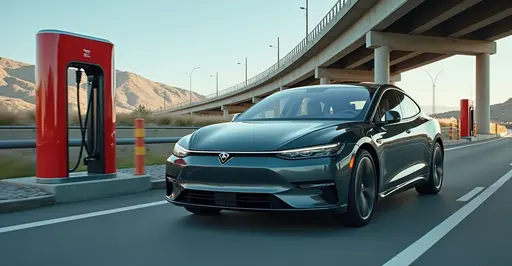
The EV Charging Revolution Accelerates
Major automakers are partnering with utility companies to rapidly expand electric vehicle charging infrastructure across North America's highway systems. This unprecedented collaboration aims to address range anxiety and support the transition to electric transportation.
Ionna Leads the Charge
The automaker coalition Ionna has reached a significant milestone with over 3,000 contracted EV charging locations nationwide. This joint venture between BMW, GM, Honda, Hyundai, Kia, Mercedes-Benz, Stellantis, and Toyota recently announced a partnership with convenience store chain Wawa, adding strategic highway-adjacent locations to its growing network.
Strategic Highway Expansion
The new "Rechargeries" will debut at Wawa locations along critical transportation corridors, including sites in Daytona Beach, Bradenton, Pensacola, and Orlando. These locations provide ideal stopping points for long-distance travelers with amenities like restrooms, food services, and convenience shopping during charging sessions.
Ionna CEO Seth Cutler emphasized: "We're creating charging hubs where drivers can recharge comfortably while knowing they're well cared for." The company aims to deploy 30,000 charging bays by 2030 despite recent challenges in federal funding allocations.
Utility Partnerships Power Growth
Utility companies play a crucial role in this expansion by providing:
- Grid connection expertise
- Demand management solutions
- Infrastructure financing
- Renewable energy integration
The Convenience Store Advantage
Retail partnerships form a cornerstone of this expansion strategy. Wawa, which already offers charging at over 175 of its 1,100 locations, represents the latest in a series of strategic alliances following December's partnership with Sheetz convenience stores.
This model leverages existing high-traffic locations with 24/7 accessibility, addressing two critical barriers to EV adoption: charging availability and charge time utilization.
Challenges and Future Outlook
Despite progress, challenges remain:
- Grid capacity limitations in rural areas
- Standardization of charging connectors
- Balancing charging speeds with battery health
As Chris Pateman-Jones of Connected Kerb noted: "True EV adoption requires charging to be as convenient as refueling - we're making that a reality."

 Nederlands
Nederlands
 English
English
 French
French
 Deutsch
Deutsch
 Espaniol
Espaniol
 Portugese
Portugese



